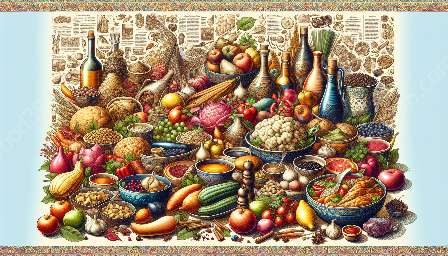Bread and grains have played a central role in ancient food culture, shaping traditions, rituals, and the evolution of food culture. This topic cluster explores the historical and cultural significance of bread and grains in ancient civilizations.
Ancient Food Traditions and Rituals
Bread and grains held deep symbolism and significance in the ancient food traditions and rituals of various cultures. In many ancient societies, bread and grains were essential staples that formed the basis of daily sustenance and were central to religious and ceremonial practices.
For example, in ancient Egypt, bread was not only a dietary staple but also held religious symbolism. The Egyptians revered the goddess Tefnut, who was associated with moisture and water, essential elements for growing grain. The act of baking bread was ritualistic and was often accompanied by offerings to the gods.
Similarly, in ancient Greece, bread, particularly wheat-based bread, held significant cultural and religious importance. Wheat was considered a gift from the goddess Demeter, the goddess of the harvest, and the Eleusinian Mysteries, an ancient religious rite, involved the ceremonial consumption of barley-based bread as a symbol of spiritual nourishment.
These examples highlight the integral role of bread and grains in ancient food traditions and rituals, encompassing both practical sustenance and deeply rooted cultural and spiritual symbolism.
Origin and Evolution of Food Culture
The significance of bread and grains in ancient food culture is intricately tied to the origin and evolution of food culture itself. The cultivation and consumption of grains marked a pivotal shift in human society, leading to the development of settled communities and the rise of agrarian civilizations.
Grains, such as wheat, barley, and rice, became the foundation of ancient agricultural societies, fueling population growth and enabling the formation of complex civilizations. The cultivation of grains fostered the development of specialized farming techniques, storage facilities, and trade networks, laying the groundwork for the evolution of food culture.
Moreover, the processing of grains into bread represented a significant technological and culinary advancement that transformed ancient diets and culinary practices. The art of baking bread, from grinding grains to kneading dough and baking, became a hallmark of ancient culinary expertise and innovation.
As ancient food cultures flourished, the significance of bread and grains extended beyond mere sustenance, shaping culinary traditions, social customs, and cultural identity. Different regions and civilizations developed unique bread-making techniques, bread varieties, and rituals surrounding bread consumption, reflecting the rich diversity and complexity of ancient food culture.
In conclusion, the significance of bread and grains in ancient food culture reverberates through history, leaving an enduring legacy in the realms of food traditions, rituals, and the evolution of food culture. By delving into the cultural and historical importance of bread and grains, we gain a deeper understanding of the integral role these staples played in shaping ancient societies and their culinary heritage.


